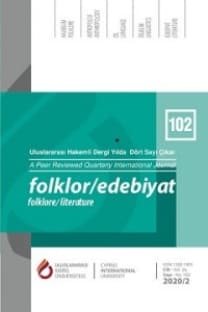“ONZE VİNGER ZİT NOG İN HET GAT” 400. YIL VESİLESİYLE HOLLANDA CANON’U VE KOLEKTİF BELLEK ÜZERİNE DÜŞÜNCELER
Hollanda tarihinde önemli görülen olayları, kişileri ve dönemleri temsil eden elli konu başlığının ve bunların kısaca anlatımını içeren Canon kitabı, Hollanda’daki orta dereceli okullarda tarih eğitiminde kullanılmak üzere tasarlanan bir tarih kitabı olmanın yanı sıra, Hollanda kolektif belleğinin asgari bir bileşkesini de temsil etme iddiasını taşımaktadır. 3 Temmuz 2007 tarihinde, Canon Komitesi tarafından Hollanda Eğitim, Kültür ve Bilim Bakanlığına sunulan Canon kitabı Hollandaca ve İngilizce dışında, Hollandalılar’ı oluşturan büyük demografik grupların anadillerine de tercüme edilmiştir. Bu nitelikleri nedeniyle Canon kitabı gerek ulusal gerekse uluslararası siyasetin gündemini oluşturan kimlik, milliyetçilik ve demokrasi gibi tartışmalarla yakından ilişkilidir. Aynı zamanda özellikle II. Dünya Savaşı’ndan itibaren geçerlilik kazanan Avrupa’yı yalnızca bir coğrafi bölgenin adı değil fakat siyasal, toplumsal, ekonomik, kültürel vb. nitelikleri de kapsayan, Avrupalılığı mümkün kılan ortak geçmiş duygusunu da hesaba katmayı gerektirir biçimindeki görüş Canon ve benzeri girişimlere daha yakından bakmayı gerektirmektedir. Buradan hareketle, bu yazının amacı, Canon kitabını hem Hollanda’da yaşayan Türkiyeli nüfusu doğrudan ilgilendiren etkileri bakımından tartışmak hem de kolektif bellek, bellek rejimi, geçmişle hesaplaşma gibi konular üzerinde bir düşünme pratiği gerçekleştirmektir. Canon üzerine düşünmek aynı zamanda geçmişin farklı kaynaklardan kolektif belleğe dahil edilmesine olanak veren çok kültürlü bir bellek siyaseti ve aynı zamanda eşit, demokratik ve çoğulcu toplumsallıklar üzerine düşünmek anlamına gelir.
Anahtar Kelimeler:
Canon, Hollanda, Kolektif Bellek, Bellek rejimi, Geçmişle Hesaplaşma
Thoughts on Dutch Canon and Collective Memory on the Occasion of 400th Anniversary
The Canon book containing fifty titles (windows) and corresponding texts indicating the significant events, people and themes in the history of the Netherlands, has the claim of representing the minimum product of Dutch collective memory as well as being designed to be used as the history book in the secondary school curriculum. The Canon book which was presented to the Dutch Minister of Education, Culture and Science by the Committee for the Development of the Dutch Canon on July 3rd 2007 was published not only in Dutch and English but also translated to the languages of the main demographic groups making up the Netherlands. Because of these qualities the Canon book is closely connected with the debates of identity, nationalism and democracy laying on the agenda of national as well as international politics. In addition that, the idea which became relevant after the WWII that the Europe is not only the name of an geographic place but is about Europeanness based on the idea of common past encompassing its political, social, economic, cultural characteristics calls for a closer look at the Canon book. From this point of view, the aim of this article is both to evaluate the Canon book with respect to its effects concerning the immigrants originates from Turkey and to make a consideration on the subjects of collective memory, memory regime, coming to terms with the past. To make a consideration on Canon also means thinking on a multicultural memory regime allowing the past to arise from variable sources and to become a part of the collective memory as well as on equal, democratic and pluralistic sociabilities.
___
- Ana Hatlarıyla Hollanda Tarihi (De Canon) (2008) Hollandaca Aslından Çeviren, Mustafa Güleç, Kebikeç Yayınları, Ankara.
- Duyvendak, Jan Willem (2011) The Politics of Home, Palgrave Macmillan.
- Grever, Maria ve Ribbens, Kees (2008) “The Dynamics of Memories and the Process of Canonization”, The Gender of Memory, Cultures of Remembrance in Nineteenth and Twentieeth-Century Europe, S. PaletscheckS. Schraut (eds.), Campus verlag, Frankfurt and New York.
- Hesse, Barnor (2002) “Forgatten Like a Bad Dream: Atlantic Slavery and the Ethics of Postcoloial Memory”, Relocating Postcolonialism, David Theo Goldberg and Ato Quayson (eds.), Blackwell Publishers, Oxford, 2002.
- Leledakis, Kanakis (2000) Toplum ve Bilinçdışı, Çev., Abdullah Yılmaz, Ayrıntı Yayınları, İstanbul.
- Levy, Daniel (2011) Michael Heinlein and Lars Breuer, “Reflexive Particularism and Cosmopolitanization: The Reconfiguration of the National”, Global Networks, 11(2).
- Nora, Pierre (2006) Hafıza Mekanları, Dost Kitabevi Yayınları, Ankara.
- Sancar, Mithat (2008) Geçmişle Hesaplaşma”, İletişim Yayınları, İstanbul, 2008,
- Zürcher, Erik Jan (2008) “Türkiye’ye Benzemek”, Kebikeç, No. 25.
- ISSN: 1300-7491
- Başlangıç: 1994
- Yayıncı: -
Sayıdaki Diğer Makaleler
Türkçede Sözvarlığı, Anlam ve Yapıyla İlgili Yeni Gelişmeler
REFİK HALİT KARAY’IN ANAHTAR ADLI ROMANINDA MEKÂN İMGELERİ
Kadın ve Kadınlığa Dair II. Meşrutiyet Dönemi Dergilerinden Yansımalar (1908-1918)
Sovyet Rusya ve İtalya Gezilerinin Türk Siyasal Yaşamına Etkisi (1930-1932)
“Moğolların Gizli Tarihi’nde Ant İçmekle İlgili Bazı Gelenekler
Üslüp Özellikleri Açısından Berci Kristin Çöp Masalları
Batı Edebiyatında Muhayyel Bir Şehir: Edmonde De Amicis’in İstanbul’u
Orhan Kemal Koçak, Dilek Özhan Koçak
Havva’nın Öyküsü: Kozmolojik ve Antropogonik Mitlerden Kadın Yaratımına Senkretik Bir Yaklaşım
